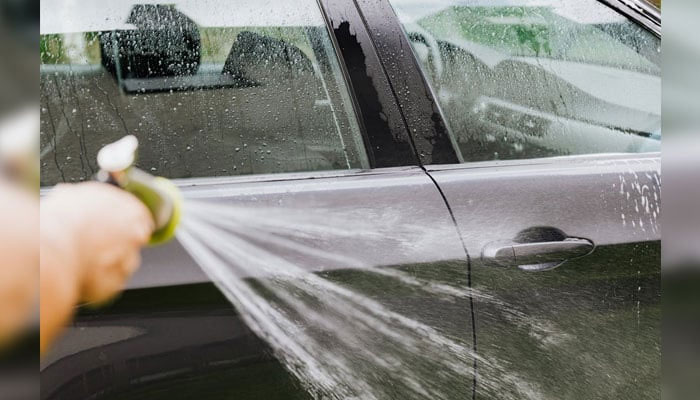Drying out
Changing climate patterns with longer heatwaves, prolonged droughts and erratic rainfall made water security urgent issue
Picture this: in certain areas of Lahore, people are forced to use water contaminated with sewage for drinking, cooking, and bathing. In the same city, luxury homes waste over 400 litres of clean water in a single car wash. This contrast is a stark illustration of the widening economic and environmental inequality in Pakistan. While the privileged consume resources without restraint, the underprivileged barely have access to the basics. Encouragingly, in a much-needed intervention, the Lahore High Court (LHC) has mandated that all new homes larger than one kanal must include the installation of a water recycling plant. Justice Shahid Karim, who issued the ruling, emphasised the urgent need for conservation and called for strong enforcement of this requirement. He also raised concerns about water waste at service stations, calling excessive use a punishable offence. The court has also recommended involving religious leaders to spread awareness, leveraging their influence to encourage more responsible water use.
This ruling couldn’t have come at a better time. With summer approaching, many upper-class households will clean and refill swimming pools, water their lawns generously and wash multiple vehicles, while millions struggle to collect even a few litres of clean water each day. It is a deeply unfair reality, and this policy could mark a step in the right direction – if actually implemented, that is. Requiring recycling systems in large homes sends a message: waste is no longer acceptable, regardless of wealth. If enforced properly, this could spark a culture shift, encouraging households to take personal responsibility for how they use water. Pakistan is already among the most water-stressed countries in the world. While AI and innovation continue to drive the future, they cannot replace the natural resources we are rapidly depleting. On top of that, changing climate patterns – with longer heatwaves, prolonged droughts and erratic rainfall – have made water security an urgent issue.
In March, the Indus River System Authority (IRSA) warned Punjab and Sindh of up to 35 per cent water shortages during the final phase of the crop season. For a country with an agriculture-driven economy, such a shortage threatens both food security and livelihoods. Water that could support farming is instead being used to maintain lifestyles of luxury. Other cities must also be encouraged to follow this example. Beyond working with religious leaders, we must educate young people through school seminars and college campaigns. Water conservation is a collective responsibility. We cannot survive without water. And only we can protect it.
-
 Denzel Washington Surprises LeBron James
Denzel Washington Surprises LeBron James -
 Cillian Murphy's Hit Romantic Drama Exits Prime Video: Here's Why
Cillian Murphy's Hit Romantic Drama Exits Prime Video: Here's Why -
 Paris Hilton Reveals What Keeps Her Going In Crazy Schedule
Paris Hilton Reveals What Keeps Her Going In Crazy Schedule -
 Deep Freeze Returning To Northeastern United States This Weekend: 'Dangerous Conditions'
Deep Freeze Returning To Northeastern United States This Weekend: 'Dangerous Conditions' -
 Inside Dylan Efron's First 'awful' Date With Girlfriend Courtney King
Inside Dylan Efron's First 'awful' Date With Girlfriend Courtney King -
 'Sugar' Season 2: Colin Farrell Explains What Lies Ahead After THAT Plot Twist
'Sugar' Season 2: Colin Farrell Explains What Lies Ahead After THAT Plot Twist -
 ‘Revolting’ Sarah Ferguson Crosses One Line That’s Sealed Her Fate As Well As Andrew Mountbatten-Windsor’s
‘Revolting’ Sarah Ferguson Crosses One Line That’s Sealed Her Fate As Well As Andrew Mountbatten-Windsor’s -
 AI Rivalry Heats Up As Anthropic Targets OpenAI In Super Bowl Ad
AI Rivalry Heats Up As Anthropic Targets OpenAI In Super Bowl Ad -
 Kate Middleton, Prince William Share Message Ahead Of Major Clash
Kate Middleton, Prince William Share Message Ahead Of Major Clash -
 Is Dark Matter Real? New Theory Proposes It Could Be Gravity Behaving Strangely
Is Dark Matter Real? New Theory Proposes It Could Be Gravity Behaving Strangely -
 Viral AI Caricature Trend: Is Your Personal Data Really Safe?
Viral AI Caricature Trend: Is Your Personal Data Really Safe? -
 Lil Jon’s Late Son, Nathan Smith Spoke Highly Of His Father Before His Tragic Death
Lil Jon’s Late Son, Nathan Smith Spoke Highly Of His Father Before His Tragic Death -
 China Boosts Reusable Spacecraft Capabilities By Launching For The Fourth Time
China Boosts Reusable Spacecraft Capabilities By Launching For The Fourth Time -
 Bianca Censori On Achieving 'visibility Without Speech': 'I Don't Want To Brag'
Bianca Censori On Achieving 'visibility Without Speech': 'I Don't Want To Brag' -
 Skipping Breakfast? Here Are Some Reasons Why You Shouldn't
Skipping Breakfast? Here Are Some Reasons Why You Shouldn't -
 'Concerned' Prince Harry Future Plans For Lilibet, Archie Exposed
'Concerned' Prince Harry Future Plans For Lilibet, Archie Exposed




